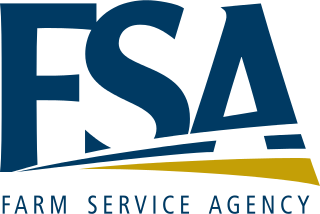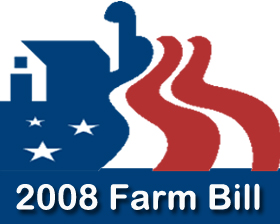Related Research Articles

The United States Department of Agriculture (USDA) is the federal executive department responsible for developing and executing federal laws related to farming, forestry, rural economic development, and food. It aims to meet the needs of commercial farming and livestock food production, promotes agricultural trade and production, works to assure food safety, protects natural resources, fosters rural communities and works to end hunger in the United States and internationally. It is headed by the Secretary of Agriculture, who reports directly to the President of the United States and is a member of the president's Cabinet. The current secretary is Tom Vilsack, who has served since February 24, 2021.
The United States Rural Utilities Service (RUS) administers programs that provide infrastructure or infrastructure improvements to rural communities. These include water and waste treatment, electric power, and telecommunications services. It is an operating unit of the USDA Rural Development agency of the United States Department of Agriculture (USDA). It was created in 1935 as the Rural Electrification Administration (REA), a New Deal agency promoting rural electrification.

The Farm Service Agency (FSA) is the United States Department of Agriculture agency that was formed by merging the farm loan portfolio and staff of the Farmers Home Administration (FmHA) and the Agricultural Stabilization and Conservation Service (ASCS). The Farm Service Agency implements agricultural policy, administers credit and loan programs, and manages conservation, commodity, disaster, and farm marketing programs through a national network of offices. The Administrator of FSA reports to the Under Secretary of Agriculture for Farm Production and Conservation. The current administrator is Zach Ducheneaux. The FSA of each state is led by a politically appointed State Executive Director (SED).
The Iowa Communications Network (ICN) is a state-administered fiber optics network designed to provide equal access to citizens including Iowans with modern telecommunication resources.
The Rural Housing Service (RHS) is an agency of the United States Department of Agriculture (USDA). Located within the Department's Rural Development mission area. RHS operates a broad range of programs to provide moderate- low- and very-low-income Americans in rural communities with:

The Juvenile Justice and Delinquency Prevention Act of 1974 (JJDPA) is a United States federal law providing formula grants to states that follow a series of federal protections on the care and treatment of youth in the juvenile justice and criminal justice systems.

The Federal Agriculture Improvement and Reform Act of 1996, known informally as the Freedom to Farm Act, the FAIR Act, or the 1996 U.S. Farm Bill, was the omnibus 1996 farm bill that, among other provisions, revises and simplifies direct payment programs for crops and eliminates milk price supports through direct government purchases.

The Higher Education Act of 1965 (HEA) was legislation signed into United States law on November 8, 1965, as part of President Lyndon Johnson's Great Society domestic agenda. Johnson chose Texas State University, his alma mater, as the signing site. The law was intended "to strengthen the educational resources of our colleges and universities and to provide financial assistance for students in postsecondary and higher education". It increased federal money given to universities, created scholarships, gave low-interest loans for students, and established a National Teachers Corps. The "financial assistance for students" is covered in Title IV of the HEA.

The Farm Security and Rural Investment Act of 2002, also known as the 2002 Farm Bill, includes ten titles, addressing a great variety of issues related to agriculture, ecology, energy, trade, and nutrition. This act has been superseded by the 2007 U.S. Farm Bill.

USDA Rural Development (RD) is a mission area within the United States Department of Agriculture which runs programs intended to improve the economy and quality of life in rural parts of the United States.

In the United States, the farm bill is the primary agricultural and food policy instrument of the federal government. Every five years, Congress deals with the renewal and revision of the comprehensive omnibus bill.

The Food, Conservation, and Energy Act of 2008 was a $288 billion, five-year agricultural policy bill that was passed into law by the United States Congress on June 18, 2008. The bill was a continuation of the 2002 Farm Bill. It continues the United States' long history of agricultural subsidies as well as pursuing areas such as energy, conservation, nutrition, and rural development. Some specific initiatives in the bill include increases in Food Stamp benefits, increased support for the production of cellulosic ethanol, and money for the research of pests, diseases and other agricultural problems.

The American Housing Act of 1949 was a landmark, sweeping expansion of the federal role in mortgage insurance and issuance and the construction of public housing. It was part of President Harry Truman's program of domestic legislation, the Fair Deal.

The Agricultural Research, Extension, and Education Reform Act of 1998 was separate legislation that revised and reauthorized federally supported agricultural research, education, and extension programs from June 1998 through May 2002. The 1998 Act built upon reforms that were made in the research title of the farm law in effect at the time, the 1996 farm bill. Key provisions were new accountability measures for recipients of federal research funds, and a new competitive research grant program called the Initiative for Future Agriculture and Food Systems, for which mandatory funds were authorized. The 1998 law's provisions, as well as new revisions of research, education, and extension policies, are included in Title VII of the 2002 farm bill.
The Community Facilities Program (CFP), administered by the Rural Housing Service (RHS) of the United States Department of Agriculture (USDA), provides grants, loans, and loan guarantees to local governments, federally recognized tribes, and non-profit organizations.

The Consolidated Farm and Rural Development Act of 1972 or Con Act authorized a major expansion of USDA lending activities, which at the time were administered by Farmers Home Administration (FmHA). The legislation was originally enacted as the Consolidated Farmers Home Administration Act of 1961. In 1972, this title was changed to the Consolidated Farm and Rural Development Act, and is often referred to as the Con Act.

The Consolidated Farm and Rural Development Act of 1961 authorized a major expansion of USDA lending activities, which at the time were administered by Farmers Home Administration (FmHA), but now through the Farm Service Agency. The legislation was originally enacted as the Consolidated Farmers Home Administration Act of 1961.

The Food, Agriculture, Conservation, and Trade (FACT) Act of 1990 — P.L. 101-624 was a 5-year omnibus farm bill that passed Congress and was signed into law.

The National Research Initiative Competitive Grants Program, often referred to as the National Research Initiative (NRI) was a United States Department of Agriculture (USDA) competitive grant program.
Initiative for Future Agriculture and Food Systems is a competitive research grants program authorized in the Agricultural Research, Extension, and Education Reform Act of 1998 and reauthorized in the 2002 farm bill. The law allows mandatory funds available from savings in food stamp program administration to be used to support the program. Grants were awarded in FY2000 and FY2001; in all other years congressional appropriators have prohibited USDA from spending funds on personnel to operate the program except for oversight of existing grants.
References
 This article incorporates public domain material from Jasper Womach. Report for Congress: Agriculture: A Glossary of Terms, Programs, and Laws, 2005 Edition (PDF). Congressional Research Service.
This article incorporates public domain material from Jasper Womach. Report for Congress: Agriculture: A Glossary of Terms, Programs, and Laws, 2005 Edition (PDF). Congressional Research Service.